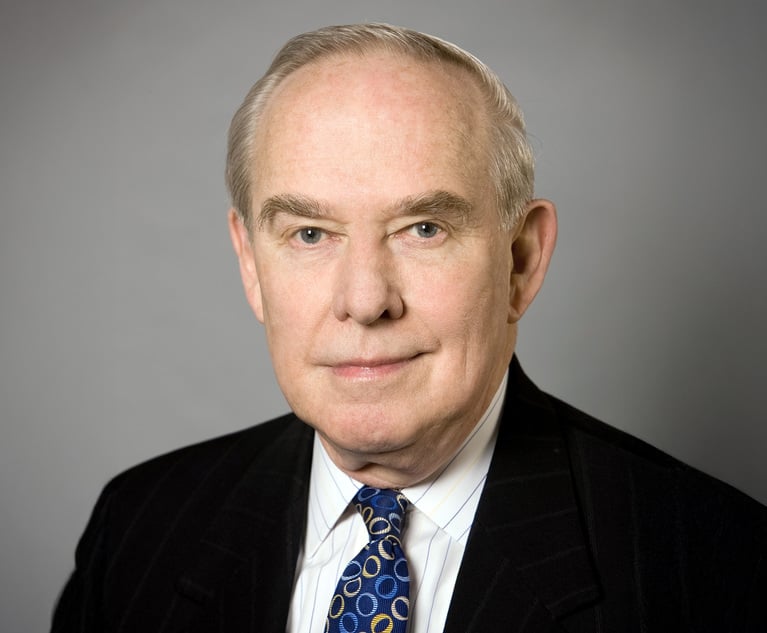Presidential Powers and Antitrust Politics: Part One
In June, we discussed the Trump administration's candidate for the top post in the Department of Justice's Antitrust Division: Makan Delrahim. During Delrahim's confirmation hearing, Sen. Amy Klobuchar pressed him, "What would you do, if you're in this job, if the president, or the vice president, or a White House staffer calls, and wants to discuss a pending investigation of an antitrust matter?" Delrahim responded, "The role of the assistant attorney general for antitrust is a law enforcement function," and that "politics will have no role in the enforcement of the antitrust laws." Delrahim's comment appeared to placate Klobuchar's present concerns about White House intercession or interference in pending antitrust investigations, although a confirmation vote by the full Senate is still pending. However, viewed historically, the constitutional role of the executive branch and the president in particular in dictating, directing and controlling antitrust enforcement policy is far more complex and nuanced. As is often the case, history provides the necessary context to answer thorny constitutional questions.
July 28, 2017 at 08:42 PM
9 minute read
In June, we discussed the Trump administration's candidate for the top post in the Department of Justice's Antitrust Division: Makan Delrahim. During Delrahim's confirmation hearing, Sen. Amy Klobuchar pressed him, “What would you do, if you're in this job, if the president, or the vice president, or a White House staffer calls, and wants to discuss a pending investigation of an antitrust matter?” Delrahim responded, “The role of the assistant attorney general for antitrust is a law enforcement function,” and that “politics will have no role in the enforcement of the antitrust laws.” Delrahim's comment appeared to placate Klobuchar's present concerns about White House intercession or interference in pending antitrust investigations, although a confirmation vote by the full Senate is still pending. However, viewed historically, the constitutional role of the executive branch and the president in particular in dictating, directing and controlling antitrust enforcement policy is far more complex and nuanced. As is often the case, history provides the necessary context to answer thorny constitutional questions.
President Theodore Roosevelt
While the Sherman Act was passed in 1890, it did not become a staple of federal domestic policy until 1901, when Teddy Roosevelt was sworn into the Office of the Presidency after William McKinley's assassination. Former Presidents Harrison, Grover Cleveland and McKinley had largely ignored the increasing consolidation of big industry. Meanwhile, the titans of the steel, oil and financial industries combined forces to build massive trusts—organizations designed to hold the stock of constituent organizations (like holding companies)—and conspired to fix and control prices, exclude and harm competitors with a panoply of predatory means and dominate the output of available goods and services in relevant markets. For example, by the
1880s, John D. Rockefeller's Standard Oil Trust reportedly controlled 90 percent of U.S. oil refining. Roosevelt had for some time been critical of the trusts (and overcapitalization in general), referring to them in a speech as “evil,” thereby not endearing himself to the titans of industry who felt it better to restrict Teddy to the (at the time) largely powerless vice-presidency. That plan worked for a short six months until Roosevelt became president after McKinley's assassination. Once he assumed the office, Roosevelt directed his attorney general, Philander C. Knox, to review the legality of the trust-created monopolies under the Sherman Act. Knox initially advised against prosecuting the trusts because of unfavorable Supreme Court precedent at the time, but on Nov. 13, 1901, J.P. Morgan announced perhaps the boldest trust then to date: the combination of the Great Northern, Northern Pacific and Union Pacific railways (each a monopoly in its own right) to form the Northern Securities Co. Sensing a political opportunity and intending to demonstrate his strength to stop the “evil” of trusts, on Feb. 20, 1902, a mere five months into his presidency, Roosevelt announced that the Department of Justice would file suit against Northern Securities. Roosevelt took an active role in the case, selecting a favorable forum (the District of Minnesota, where a related state case was pending) and directing Knox to conduct the investigation in secret until the day the Department of Justice filed suit. Within days of the announcement, Morgan arrived at the White House and demanded to know why the president had not first approached him with his concerns. As Morgan told the president, “If we have done anything wrong, send your man to my man and they can fix it up.” Roosevelt tersely responded, “That can't be done.” Knox added, “We don't want to fix it up, we want to stop it.” Morgan's gambit to fix the problem in the usual manner of the day failed when faced with the presidential big stick. Roosevelt would ultimately win the fight against Morgan. After a legal battle all the way to the Supreme Court, on March 14, 1904, Justice John Marshall Harlan announced from the bench: “No scheme or device could more certainly come within the words of the [Sherman] Act … or could more effectively and certainly suppress free competition.” Roosevelt had beaten Morgan by a 5-4 decision, and Northern Securities was dissolved under the Sherman Act.
President John F. Kennedy
Sixty years after Roosevelt's inauguration, following further trust busting cases, always-evolving judicial decisions and increasing government investigations, the nation faced a new set of priorities. Set in the mire of the Vietnam War and facing off against the Soviet Union in the dead of the Cold War, the “military industrial complex” (a term made famous by President Dwight Eisenhower's 1961 farewell address) was of paramount concern to national security. Early in President John F. Kennedy's administration, a labor strike in the steel industry threatened to disrupt production and contribute to rising monetary inflation. To avoid these political nightmares, Kennedy using the full powers of the presidency pressured the largest steel company, United States Steel (ironically formed by J.P. Morgan and organized with the legal help of Roosevelt's AG Philander Knox), and the United Steelworkers Union to reach a deal to keep wages low and avoid output disruptions. Kennedy's strategy succeeded, and U.S. Steel and the union struck a deal to limit wage increases to 10 cents an hour, a major success for his administration.
However, less than two weeks later, the chairman and CEO of U.S. Steel, Roger Blough, personally handed the president a letter in the oval office informing him that U.S. Steel would be raising prices by 3.5 percent, which other steel companies would quickly follow. Furious, the president exclaimed to Blough “you double crossed me” and later confided with his Secretary of Labor (and later Supreme Court Justice) Arthur Goldberg, “He f–ked me. They f—ked us and we've got to try to f–k them.” In an April 11, 1962, press conference, Kennedy excoriated the “simultaneous and identical actions of U.S. Steel and other leading steel corporations,” accusing “a tiny handful of steel executives whose pursuit of private power and profit exceeds their sense of public responsibility” of showing “utter contempt for the interests of 185 million Americans.” The decision, he said, would increase consumer prices and “add … an estimated $1 billion to the cost of [American] defenses, at a time when every dollar is needed for national security and other purposes.”
This content has been archived. It is available through our partners, LexisNexis® and Bloomberg Law.
To view this content, please continue to their sites.
Not a Lexis Subscriber?
Subscribe Now
Not a Bloomberg Law Subscriber?
Subscribe Now
NOT FOR REPRINT
© 2025 ALM Global, LLC, All Rights Reserved. Request academic re-use from www.copyright.com. All other uses, submit a request to [email protected]. For more information visit Asset & Logo Licensing.
You Might Like
View All
Cozen O'Connor's Bernard Nash Pioneered the Modern State AGs Practice. Now He's Hanging Up His Boots
6 minute read
What to Know About the New 'Overlapping Directorship' Antitrust Development
4 minute read
Bondi and Big Tech: What Trump's Choice for US AG Could Mean for Antitrust Enforcement
7 minute readTrending Stories
- 1Thursday Newspaper
- 2Public Notices/Calendars
- 3Judicial Ethics Opinion 24-117
- 4Rejuvenation of a Sharp Employer Non-Compete Tool: Delaware Supreme Court Reinvigorates the Employee Choice Doctrine
- 5Mastering Litigation in New York’s Commercial Division Part V, Leave It to the Experts: Expert Discovery in the New York Commercial Division
Who Got The Work
J. Brugh Lower of Gibbons has entered an appearance for industrial equipment supplier Devco Corporation in a pending trademark infringement lawsuit. The suit, accusing the defendant of selling knock-off Graco products, was filed Dec. 18 in New Jersey District Court by Rivkin Radler on behalf of Graco Inc. and Graco Minnesota. The case, assigned to U.S. District Judge Zahid N. Quraishi, is 3:24-cv-11294, Graco Inc. et al v. Devco Corporation.
Who Got The Work
Rebecca Maller-Stein and Kent A. Yalowitz of Arnold & Porter Kaye Scholer have entered their appearances for Hanaco Venture Capital and its executives, Lior Prosor and David Frankel, in a pending securities lawsuit. The action, filed on Dec. 24 in New York Southern District Court by Zell, Aron & Co. on behalf of Goldeneye Advisors, accuses the defendants of negligently and fraudulently managing the plaintiff's $1 million investment. The case, assigned to U.S. District Judge Vernon S. Broderick, is 1:24-cv-09918, Goldeneye Advisors, LLC v. Hanaco Venture Capital, Ltd. et al.
Who Got The Work
Attorneys from A&O Shearman has stepped in as defense counsel for Toronto-Dominion Bank and other defendants in a pending securities class action. The suit, filed Dec. 11 in New York Southern District Court by Bleichmar Fonti & Auld, accuses the defendants of concealing the bank's 'pervasive' deficiencies in regards to its compliance with the Bank Secrecy Act and the quality of its anti-money laundering controls. The case, assigned to U.S. District Judge Arun Subramanian, is 1:24-cv-09445, Gonzalez v. The Toronto-Dominion Bank et al.
Who Got The Work
Crown Castle International, a Pennsylvania company providing shared communications infrastructure, has turned to Luke D. Wolf of Gordon Rees Scully Mansukhani to fend off a pending breach-of-contract lawsuit. The court action, filed Nov. 25 in Michigan Eastern District Court by Hooper Hathaway PC on behalf of The Town Residences LLC, accuses Crown Castle of failing to transfer approximately $30,000 in utility payments from T-Mobile in breach of a roof-top lease and assignment agreement. The case, assigned to U.S. District Judge Susan K. Declercq, is 2:24-cv-13131, The Town Residences LLC v. T-Mobile US, Inc. et al.
Who Got The Work
Wilfred P. Coronato and Daniel M. Schwartz of McCarter & English have stepped in as defense counsel to Electrolux Home Products Inc. in a pending product liability lawsuit. The court action, filed Nov. 26 in New York Eastern District Court by Poulos Lopiccolo PC and Nagel Rice LLP on behalf of David Stern, alleges that the defendant's refrigerators’ drawers and shelving repeatedly break and fall apart within months after purchase. The case, assigned to U.S. District Judge Joan M. Azrack, is 2:24-cv-08204, Stern v. Electrolux Home Products, Inc.
Featured Firms
Law Offices of Gary Martin Hays & Associates, P.C.
(470) 294-1674
Law Offices of Mark E. Salomone
(857) 444-6468
Smith & Hassler
(713) 739-1250






